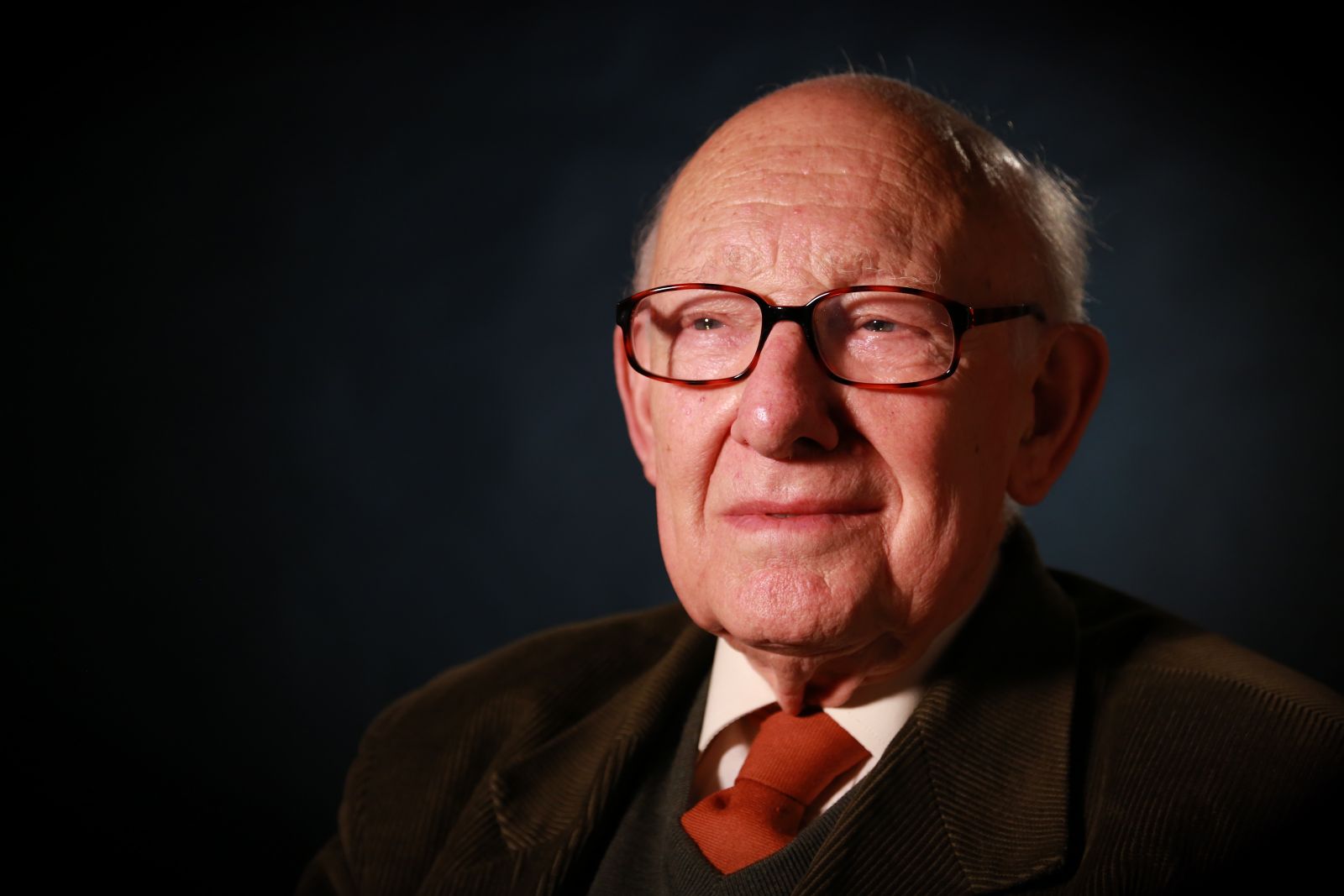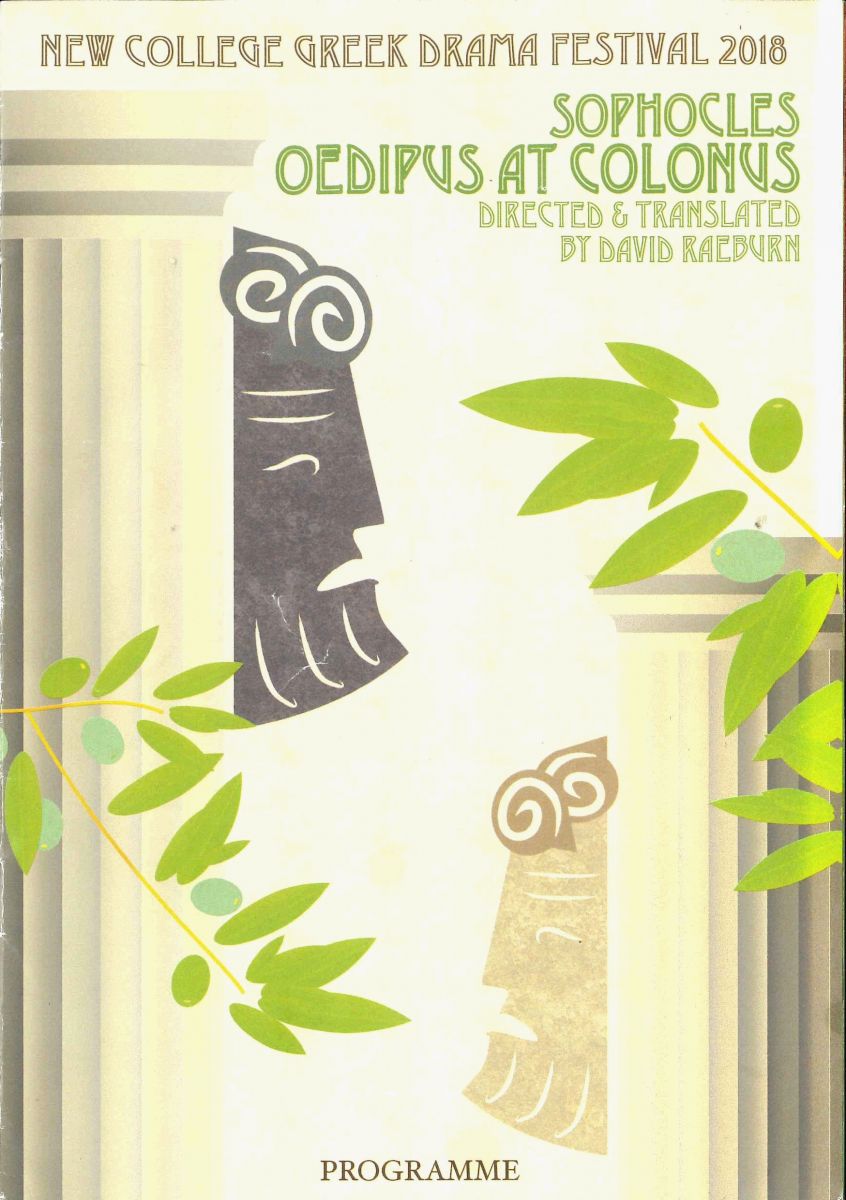Practitioners' Voices in Classical Reception Studies
ISSN 1756-5049
You are here
- Home
- Introduction by Lorna Hardwick
Introduction by Lorna Hardwick

In the interview, David refers to various aspects of the Greek Play traditions in schools and universities. Some of these have received detailed attention in recent scholarship but as yet there is no wide-ranging study that explores the different ways and contexts in which participation in performance has developed, with consequent effects on education, theatre practice and public perceptions of antiquity. We hope that this interview and the associated documentation will not only provide a case-study of evidence about David Raeburn’s own career and perspectives but will also provoke questions that lead to further discussion of the Greek Play traditions and their influence.
 In the Introduction to her monograph Performing Greek Drama in Oxford Amanda Wrigley discussed how performances of drama at the university grew from the 1880s, when tragedy revived and took over from the earlier 19th century fascination with burlesque as an outlet for dramatizing themes and figures from antiquity (see also Hall and Macintosh 2005). Aeschylus’ Agamemnon was performed in the original Greek at Balliol in 1880, under the auspices of Benjamin Jowett. The production toured to Eton College, Harrow School, Winchester College and then to Cambridge in 1881. This new trend led to the formation of the Oxford University Dramatic Society (OUDS) in 1884 and the staging by OUDS of Aristophanes’ Frogs in 1892 (Wrigley 2011). However, OUDS often had long gaps between productions (Wrigley 2011 includes an extensive production chronology). It was therefore left to other groups to take drama out to towns and villages that did not have regular access to theatre.
In the Introduction to her monograph Performing Greek Drama in Oxford Amanda Wrigley discussed how performances of drama at the university grew from the 1880s, when tragedy revived and took over from the earlier 19th century fascination with burlesque as an outlet for dramatizing themes and figures from antiquity (see also Hall and Macintosh 2005). Aeschylus’ Agamemnon was performed in the original Greek at Balliol in 1880, under the auspices of Benjamin Jowett. The production toured to Eton College, Harrow School, Winchester College and then to Cambridge in 1881. This new trend led to the formation of the Oxford University Dramatic Society (OUDS) in 1884 and the staging by OUDS of Aristophanes’ Frogs in 1892 (Wrigley 2011). However, OUDS often had long gaps between productions (Wrigley 2011 includes an extensive production chronology). It was therefore left to other groups to take drama out to towns and villages that did not have regular access to theatre.
There were considerable overlaps between student theatre, community outreach and eventual links with public service broadcasting drama (Wrigley 2007). Yopie Prins has added to the international picture with her analysis of the relationship in the USA between women’s education, Greek drama and translation (Prins 2017 includes photographs of productions of Greek drama at women’s colleges. For detailed focus on performance of Greek plays in the USA, see Foley 2012).
In Cambridge the Greek Play tradition was inaugurated in 1882 by Sophocles’ Ajax. Subsequently there have usually been productions every three years, excepting war years (see further Easterling 1999; Montgomery Griffiths 2007a; Classical Receptions in Drama and Poetry in English Drama database ID nos. 854, 952, 2639 [nb. to access these database entries, navigate from the Classical Receptions in Drama and Poetry in English main page to the 'Drama database', which can be searched by 'ancient playwright').
More recently, the London Festival of Greek Drama represents the collaboration of universities in London to stage Greek plays and provide workshops and lectures for school and college students and the general public. Chloe Productions, based at the Institute of Classical Studies, staged performances from 1992 -2000, directed by Russell Shone with Wendy Pank as Mask Maker (Classical Receptions in Drama and Poetry in English Drama database ID no. 909). King’s College London has continued to stage productions in the original Greek and has an extensive online archive, while the University of Hull also presented many productions, led by J. Michael Walton (Classical Receptions in Drama and Poetry in English Drama database ID no. 2528).
Schools have also had a key role in the Greek Play traditions. Examples include Bradfield College, which has a Victorian replica of a Greek theatre and in the late nineteenth century even attracted government ministers to attend (special trains from London were put on). In recent years there have also been new traditions of Greek Plays in a number of schools, including Newcastle High School (led by Alan Beale, Classical Receptions in Drama and Poetry in English Drama database ID no. 2572) and Hereford Cathedral School (Classical Receptions in Drama and Poetry in English Drama database ID nos. 2744 and ID 2778). The summer schools organised by the Joint Association of Classical Teachers (referred to by David Raeburn in his interview) have provided opportunities for students from all types of school to combine informal drama performances and readings with the intensive study of the ancient languages, before going on to university.
Distinctions between amateur and professional companies have become less rigid. Student theatre in particular has been an important gateway into professional theatre (Eastman 2013). Professional companies such as the Actors of Dionysus (AOD, founded in 1993 by David Stuttard and Tamsin Shasha) combine public performances with workshops for schools and colleges (Classical Receptions in Drama and Poetry in English Drama database ID no. 2672). AOD has become well known for its staging of new translations and daring use of physical theatre, including trapeze.
In Scotland theatre odyssey, under the leadership of John J. Taylor (who previously directed Greek plays at Bradfield) developed open air performance (including The One Man Odyssey, performed on Pittenweem Beach in 2001). The company’s work excelled in outreach and creative collaborations with amateur and professionals (Taylor 2003; Classical Receptions in Drama and Poetry in English Drama database ID nos. 2608, 2610, 2609, 2676). The Edinburgh Fringe Festival invariably stages a number of Greek plays performed and adapted by students and ad hoc companies (see Keen 1994; Eastman 2013: 27 with Classical Receptions in Drama and Poetry in English Drama database ID no. 1109). Sometimes this involves creative experiment - for example, Antigone was adapted as a multi-media dance rock opera by American students (Classical Receptions in Drama and Poetry in English Drama database ID no. 2602). Also in Scotland, the initiative Theatre Around Glasgow (TAG) was set up in 1967 in conjunction with the Citizens’ Theatre in the Gorbals district of Glasgow to take theatre of all kinds, including Greek plays, to secondary schools within a radius of about twenty miles (Burke 2003).TAG has now been absorbed by the Citizens’ Theatre and an archive is maintained.
Overall, a number of freely accessible searchable databases document examples of these student, amateur, professional, collaborative and community strands in the Greek play tradition (together with documentation of productions in professional and commercial theatre). Interviews with theatre practitioners and translators provide additional insights (for a critical analysis of interview methodology see Burke and Innes 2004). Thus the body of ‘case study’ evidence that informs practice and enables research has grown. The issue of which are the most pressing questions to ask of the data remains. There can be no doubt that the Greek Play tradition, in its various forms, has been influential in disseminating knowledge and appreciation of the plays, in motivating students and teachers and in extending participation and spectating to more diverse communities, but there are questions about ‘to whom?’ and ‘with what purpose’ and ‘with what effect?’ Considerable claims have been made about the significance of theatre in bringing about transformation of perspectives and understanding for participants and spectators - as individuals, as members of what may be ad hoc and temporary communities and as decision-making members of society (Fischer-Lichte 2010; Montgomery Griffiths 2007b; and for a historical study, Wiles 2011, which engages with the wider context of the relationship of theatre with social and political change). More cautionary voices point to the problems of tracking and analysing individual and group responses both at the time and subsequently (Eastman 2013: 34-6). To investigate possibilities, develop appropriate research methods and test hypotheses, further research and practice are needed!
Lorna Hardwick, October 2018
Download a PDF copy of this introduction
- Interview with David Raeburn
Transcript and audio excerpts from the interview between Lorna Hardwick and David Raeburn.
References:
Burke, A., 2003, ‘Characterising the Chorus: Individual and Collective in Four Recent productions of Greek Tragedy’, in L. Hardwick and C. Gillespie, eds., The Role of Greek Drama in Crossing and Redefining Cultural Boundaries,Milton Keynes: Reception of Classical Texts Project, 13-33 (https://www.open.ac.uk/arts/research/greekplays/publications)
Burke, A. and Innes, P., 2004, ‘Interviews as a methodology for performance research 2 – Academic Interviews’. Milton Keynes: Reception of Classical Texts Research Project Critical Essays (www.open.ac.uk/arts/research/greekplays/publications/essays/burke-innes-interviews-performance-research)
Easterling, P.E., 1999, ‘The Early Years of the Cambridge Greek Play: 1882- 1912’, in C. Stray, ed., Classics in 19th and 20th Century Cambridge: Curriculum, Culture and Community, Cambridge Philological Society Supplementary Volume 24, 27-47, Cambridge: Cambridge Philological Society.
Eastman, H., 2013, ‘Greek Tragedy and the Modern Director’, in A. Bakogianni, ed., Dialogues with the Past 1: Classical Reception Theory and Practice, Bulletin of the Institute of Classical Studies Supplement 126-1, London: ICS, 27-37.
Fischer-Lichte, E., 2010, ‘Performance as Event- Reception as Transformation’, in E. Hall and S. Harrop, eds., Theorising Performance: Greek Drama, Cultural History and CriticalPractice, London: Duckworth, 29-42.
Foley, H.P., 2012, Reimagining Greek Tragedy on the American Stage, Berkeley: University of California Press.
Griffiths, J.M. 2007a, ‘Staging the Cambridge Greek Play 2001: Electra’, Practitioners’ Voices in Classical Reception Studies (https://www.open.ac.uk/arts/research/pvcrs/2007/montgomery)
Griffiths, J.M., 2007b, ‘The Experiential Turn: Shifting Methodologies in the study of Greek Drama’, New Voices in Classical Reception Studies, Issue 2 (https://fass.open.ac.uk/research/newvoices)
Hall, E. and Macintosh, F., 2005, Greek Tragedy and the British Theatre 1660-1914, Oxford: Oxford University Press.
Keen, A. G, 1994, ‘Greek Plays at the Edinburgh Festival during August-September 1994’ (https://www.didaskalia.net/issues/vol1no5/fringe.html)
Prins, Y., 2017, Ladies' Greek in Victorian Translations of Tragedy at Women’s Colleges, Princeton NJ: Princeton University Press.
Taylor, J.J., 2003, ‘Performing the Odyssey: A Practitioner’s View’, in L. Hardwick and C. Gillespie, eds., The Role of Greek Drama in Crossing and Redefining Cultural Boundaries, Milton Keynes: Reception of Classical Texts Project, 34-42 (https://www.open.ac.uk/arts/research/greekplays/publications/open-seminar-series-2002/performing-the-odyssey)
Wiles, D., 2011, Theatre and Citizenship: The History of a Practice, Cambridge: Cambridge University Press.
Wrigley, A., 2007, ‘Stages of Imagination: Greek Plays on BBC Radio’, in C. Stray, ed., Remaking the Classics: Literature, Genre and Media in Britain, 1800-2000, London: Duckworth, 57-73.
Wrigley, A., 2011, Performing Greek Drama in Oxford and on tour with the Balliol Players, Exeter: University of Exeter Press (includes extensive bibliography and chronology of productions).
Websites, archives and databases:
Actors of Dionysus (AOD): www.actorsofdionysus.com
Archive of Performances of Greek and Roman Drama (APGRD): http://www.apgrd.ox.ac.uk/about-us
King’s College London Greek Play Archive: www.kcl.ac.uk/artshums/depts/classics/about/greek/archives/indexaspx
Theatre Around Glasgow archive: https://universityofglasgowlibrary.wordpress.com/2012/09/07/the-archives-of-tag-theatre-company/
theatreodyssey: www.theatreodyssey.com
Open University Reception of Classical Texts Research Project: www.open.ac.uk/arts/research/greekplays/
University College London Classical Play: https://www.ucl.ac.uk/classics/classical-play